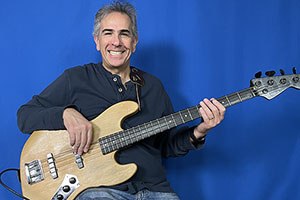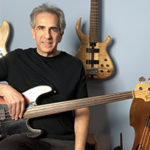It’s not as hard as you think
By Jon Liebman
Week of November 15, 2021
Most followers of For Bass Players Only have been playing for a while, maybe on and off over the years. They’re not trying to be rock stars. They just want to learn bass and have fun.
Does that sound like you?
I’m guessing when you pick up your bass, either by yourself or with some friends, you can get through a blues okay, maybe a few rock tunes, and some other fun stuff, and that’s great. But how much do you understand about what you’re actually playing? And how much do you want to understand it?
Those questions came to mind during a recent conversation I had with longtime Rod Stewart bass player Conrad Korsch, published as this week’s FBPO interview. Conrad shared some really good insights about how much more enjoyable it is to play music when you know the “how” and the “why” behind the notes you’re playing. What he said holds true regardless of whether you’re learning bass or any other instrument.
“I always feel like if you learn your music theory and you learn to read music, the possibilities are endless,” Conrad says.
Think about it. Suppose you’ve learned to play a song. You know it well and you find yourself really digging in whenever you play it. Everything’s great! Then suddenly, the band gets a new singer who does that song is some “weird” key. You can kind of muddle through it, but now your playing becomes a lot more tentative. Forget about digging in. You’re just trying to hit the right notes. Not so great any more.
Wouldn’t you like to avoid getting into a situation like that?
Actually, when you switch from one key to another, the relationships between the chords, the notes, etc., are identical. They’re just in different places on the fingerboard. The more you understand about music theory, the easier it is to make these transitions and jump from one key to another.
And, as my students will tell you, it’s really not that hard to adapt to a new key, once you start the process. I’m always happy to see that Scales & Theory continues to be one of the more popular courses in the Bottom Line Club, right here inside For Bass Players Only.
“People are looking for shortcuts all the time,” says Conrad. “Not so much a 70-year-old, but you know what this generation is like. Everybody wants to just jump the gun, but there’s no replacement for actual studying.”
I’ve been helping people learn bass for a long time. It’s amazing what an eye-opener music theory is for people, especially when they’re learning it for the first time.
“Even if all you want to do is play the blues in the basement and drink six packs with your army buddies, that’s cool too,” Conrad says. “But you’re going to do that even better if you’ve actually learned something about music.”
Just for fun, try playing familiar tunes in different keys. When was the last time you played a rock tune in F#? Or a blues in Db? Try it! It’ll open up a whole new world for you.
Once you start to see how similar each key is to all the others, it’ll make you a better bass player, and a better all-around musician. Rock star, schmock star. Learn some music theory, play bass, and have fun!
What about you? Have a thought on the subject? Leave a comment below and let me know what you think. In the meantime, check out my interview with Conrad here.





